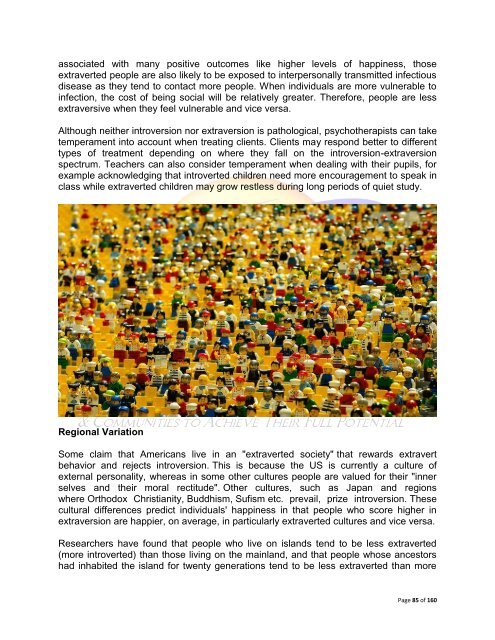The Gift of Introversion
The Gift of Introversion
The Gift of Introversion
You also want an ePaper? Increase the reach of your titles
YUMPU automatically turns print PDFs into web optimized ePapers that Google loves.
associated with many positive outcomes like higher levels <strong>of</strong> happiness, those<br />
extraverted people are also likely to be exposed to interpersonally transmitted infectious<br />
disease as they tend to contact more people. When individuals are more vulnerable to<br />
infection, the cost <strong>of</strong> being social will be relatively greater. <strong>The</strong>refore, people are less<br />
extraversive when they feel vulnerable and vice versa.<br />
Although neither introversion nor extraversion is pathological, psychotherapists can take<br />
temperament into account when treating clients. Clients may respond better to different<br />
types <strong>of</strong> treatment depending on where they fall on the introversion-extraversion<br />
spectrum. Teachers can also consider temperament when dealing with their pupils, for<br />
example acknowledging that introverted children need more encouragement to speak in<br />
class while extraverted children may grow restless during long periods <strong>of</strong> quiet study.<br />
Regional Variation<br />
Some claim that Americans live in an "extraverted society" that rewards extravert<br />
behavior and rejects introversion. This is because the US is currently a culture <strong>of</strong><br />
external personality, whereas in some other cultures people are valued for their "inner<br />
selves and their moral rectitude". Other cultures, such as Japan and regions<br />
where Orthodox Christianity, Buddhism, Sufism etc. prevail, prize introversion. <strong>The</strong>se<br />
cultural differences predict individuals' happiness in that people who score higher in<br />
extraversion are happier, on average, in particularly extraverted cultures and vice versa.<br />
Researchers have found that people who live on islands tend to be less extraverted<br />
(more introverted) than those living on the mainland, and that people whose ancestors<br />
had inhabited the island for twenty generations tend to be less extraverted than more<br />
Page 85 <strong>of</strong> 160

















